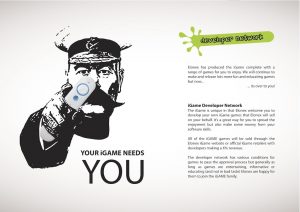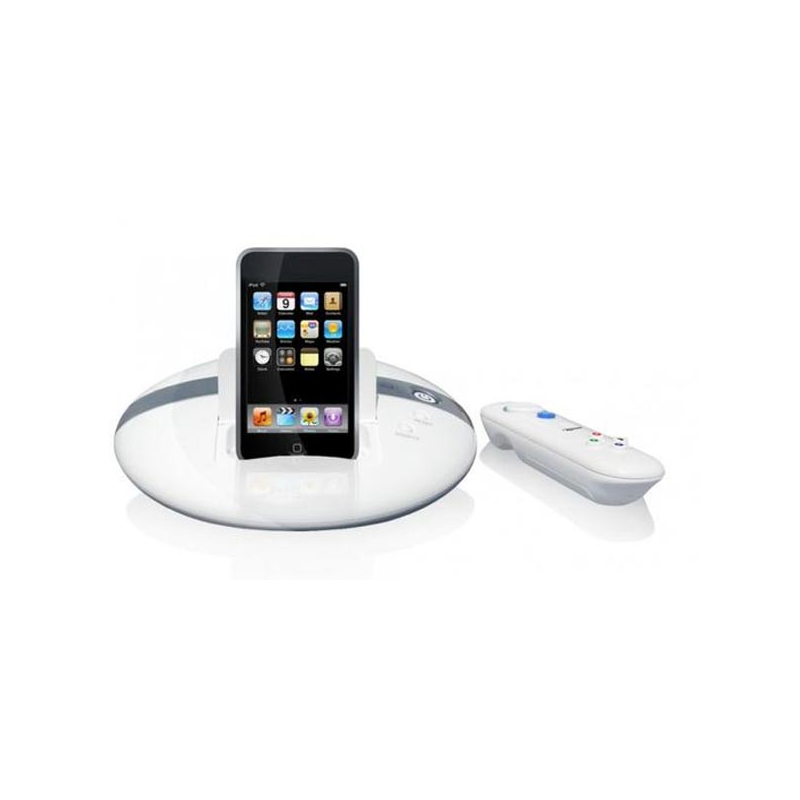|
|
|
 History
History
Founded in 1986 by German-born Israel Wetrin in his Finchley flat. He named his company by taking the last two letters of his sons’ names (Daniel and Gideon) and combining it with “Export”. The company distributed electronics and computers. In the 90s, the company even distributed their own brand of computer. In the mid 2000s, the world of electronics had switched its target audience. While electronics devices such as computers, MP3 players, were historically more aimed at technology-savvy people, the release of the iPod, iPhone and the Wii demonstrated that technology could be simple and in reach of everyone.
By 2009, Elonex was already producing iPod accessories and decided to produce a docking station for the iPod that could be used to stream Music, Video and Podcast from selected app (YouTube, iPlayer, etc). But Elonex decided to go one step further and include video game functionality within the dock. Heavily inspired by the Wii, the console didn’t try to focus on mind-blowing graphics or lengthy game play, but rather in immersive and fun-based games that could be enjoyed by all the family. As Elonex didn’t have a gaming decided to take Apple’s approach and let individual, small and major developers make the games, and also to make money from them. The company launched a recruitment program to make sure the console would have a fairly stocked launch title list. The console was also advertised to include 20 games.
Release
Released in October 2009 in the UK, the console came bundled with a 6 games and a Wii-like remote, 14 less than previously advertised. Before it launched, the system had some positive review from the press and with Christmas coming up and it’s relatively low price tag when compared to the Wii (around £100 less), the system did fairly well. The system came bundled with one controller; additional controllers were sold separately. Following a successful launch, Elonex decided to distribute the system in other European countries (such as France and Poland). But parents everywhere quickly notice that the reviews they based their purchase on were not as accurate. Although cheaper than the Wii, the games available for the console were sub-part at best. The controller scheme was also an issue : the controller is a “motion sensitive” as it can detect it has been moved, but, as it doesn’t rely on an external beacon for positioning, the controller doesn’t know where it is in space. In short, the controller can detect movement, such as mimicking the throw of a dart or a bowling ball, but the console would not know in which direction your movement was. This leads to clunky gameplay, as the game had to compensate for the shortcoming by using the game pad or timing your movement with a position slider to get the desired effect.
The console was launched with 18 titles available for it (including the built-in games). But, after the Christmas boom, the sales started to slow down. More honest reviews started to appear which hurt the sales even more. Over time, the iGAME FAMILY library would grow a little and a revised version of the iGAME FAMILY including 10 games would finally be released.
Demise
Although the concept was interesting for the time, the iGAME FAMILY was not able to generate enough interest. Elonex struggled from the start recruiting developer to participate in their new business model as shown by the initial release of 6 built-in games instead of 20. The clunky controls made it almost impossible to create a great game for the systems. With a poor user base, the developers didn’t make enough money to be worthwhile for them to continue supporting the platform. Very quickly, the prices of certain games were reduced, but it was too little too late. Elonex finally pulled the plug in 2012.
Games
25 games were available in the lifespan of the console. Some of them were bundled with the consoles, others were only available through the online store. The games needed to be bought online via a computer and downloaded to an SD cards that would insert to the back of the console.
- Assault – £1.00
- Bowling – Included
- Castlequest £1.99
- Connect5 – £2.00
- Crystal ball – Included
- Dart – Included
- Darts 2 Player – £3.00
- Farmer Trials – £4.00 (Later reduced to £2.99)
- Fire Cracker – £6.00 Later reduced to £1.99)
- Fishing – £3.00
- GoBang – Included
- Hero Kids – £5.00
- Kadoos Adventure – £7.00 (Later reduced to £2.99)
- Metal Storm – £8.00
- Mnemonics – £9.00
- Reversi – £1.00 (Later reduced to £1.99)
- Slugz – £2.00 (Later reduced to £0.99)
- Soduku – £3.00
- Space Assault – £2.99
- Table Tennis – (£4.00 – 22 Dec 2009) | Incorrectly called Ping Pong on the packaging.
- Tangram – £6.00
- Tank – £3.00 (Later reduced to £0.99)
- Tennis – £5.00
- Trampoline – £7.00
- Zodiac – Included

